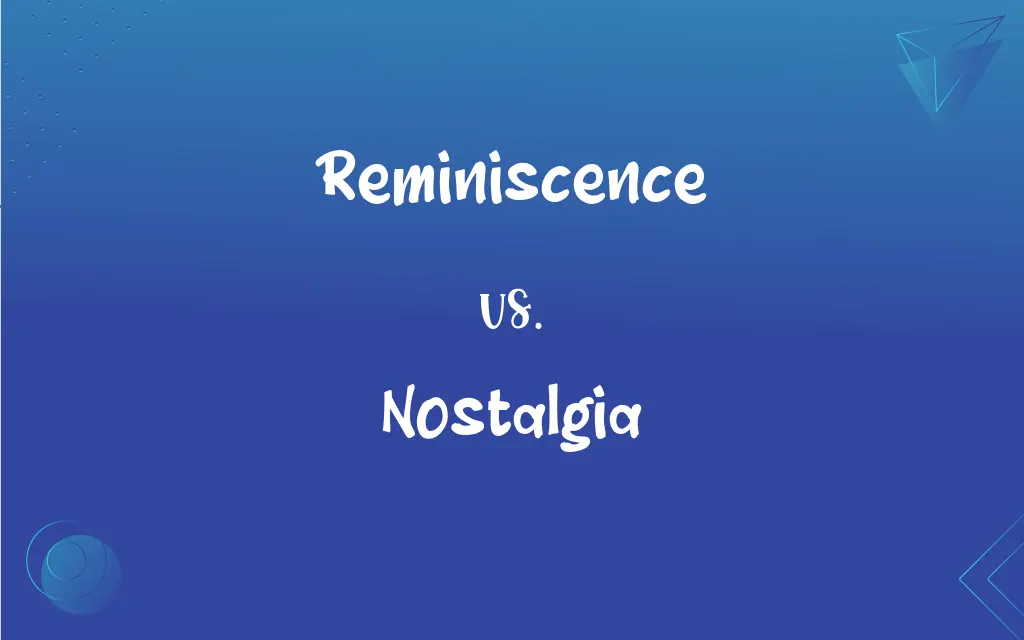Reminiscence vs. Nostalgia: What's the Difference?
By Janet White & Aimie Carlson || Updated on May 23, 2024
Reminiscence refers to the act of recalling past experiences or events, while nostalgia is a sentimental longing for the past, often idealized.

Key Differences
Reminiscence involves the act of remembering and discussing past experiences. It is a cognitive process that can be shared with others, often focusing on recounting events without necessarily involving strong emotions. Nostalgia, on the other hand, is characterized by a sentimental longing for the past. It often involves idealizing past experiences and feeling a sense of wistfulness or yearning for those times.
Reminiscence can be a neutral activity, where individuals recall and reflect on their past experiences, sharing stories or memories. It is often used in therapeutic settings to help individuals make sense of their life history and find meaning in their experiences. Nostalgia, however, is typically more emotionally charged. It involves a desire to return to or relive the past, often highlighting a contrast between the past and the present, leading to feelings of wistfulness or melancholy.
Reminiscence can be triggered by various stimuli such as photos, conversations, or anniversaries, leading individuals to recount past events. The focus is on the act of remembering itself. Nostalgia, however, involves a deeper emotional connection to the past, often triggered by sensory experiences like music, smells, or familiar places, evoking a longing for the perceived better times.
While reminiscence is a straightforward recollection of past events, nostalgia often involves an emotional response that idealizes the past, sometimes glossing over the negative aspects and focusing on the positive memories. This can lead to a bittersweet experience where the joy of the memory is mixed with a sense of loss or longing.
Reminiscence is often used as a tool in various settings such as therapy, storytelling, or social interactions to recall and share life experiences. Nostalgia, in contrast, can impact one's mood and outlook, providing comfort but also potentially leading to feelings of dissatisfaction with the present.
ADVERTISEMENT
Comparison Chart
Definition
Act of recalling past experiences
Sentimental longing for the past
Emotional Charge
Generally neutral
Emotionally charged, often wistful
Focus
Recounting and reflecting
Yearning and idealizing
Trigger
Photos, conversations, anniversaries
Music, smells, familiar places
Use in Therapy
Helps make sense of life experiences
Not typically used as a therapeutic tool
ADVERTISEMENT
Perception of Past
Neutral or balanced
Idealized and often romanticized
Reminiscence and Nostalgia Definitions
Reminiscence
Reflecting on past events and sharing memories.
Their meeting was filled with reminiscence about college days.
Nostalgia
A sentimental longing for the past.
Hearing that old song filled her with nostalgia for her teenage years.
Reminiscence
Recalling personal history.
He engaged in reminiscence while looking through old photographs.
Nostalgia
Emotional longing for past times, often idealized.
The smell of fresh bread always brought a wave of nostalgia for her grandmother's kitchen.
Reminiscence
The act of recalling past experiences.
Grandmother's reminiscence of her childhood was full of detailed stories.
Nostalgia
Wistful affection for past experiences.
Watching the old movies gave him a sense of nostalgia for the simpler days.
Reminiscence
Recounting past events without strong emotions.
The book is a reminiscence of the author's travels.
Nostalgia
Sentimentality for a perceived better past.
She felt a deep nostalgia as she flipped through her childhood photo album.
Reminiscence
A cognitive process of remembering past events.
Therapy sessions often included reminiscence to help patients connect with their past.
Nostalgia
Yearning for a bygone era.
He felt nostalgia every time he visited his hometown.
Reminiscence
The act or process of recollecting past experiences or events.
Nostalgia
A bittersweet longing for things, persons, or situations of the past.
Reminiscence
An experience or event recollected
"Her mind seemed wholly taken up with reminiscences of past gaiety" (Charlotte Brontë).
Nostalgia
The condition of being homesick; homesickness.
Reminiscence
Often reminiscences A narration of past experiences.
Nostalgia
A longing for home or familiar surroundings; homesickness.
Reminiscence
An event that brings to mind a similar, former event.
Nostalgia
(transferred sense) A bittersweet yearning for the things of the past.
Reminiscence
An act of remembering long-past experiences, especially positive or pleasant ones, often fondly.
Nostalgia
Homesickness; esp., a severe and sometimes fatal form of melancholia, due to homesickness.
Reminiscence
A mental image thus remembered.
Nostalgia
A sentimental yearning to return to an earlier time remembered as happier or more pleasant, or a former place evoking happy memories; a longing to experience again a former happy time; as, a nostalgia for the brotherhood of the Woodstock music festival; a nostalgia for the comradeship of one's college friends.
Reminiscence
The act or power of recalling past experience; the state of being reminiscent; remembrance; memory.
The other part of memory, called reminiscence, which is the retrieving of a thing at present forgot, or but confusedly remembered.
I forgive your want of reminiscence, since it is long since I saw you.
Nostalgia
Longing for something past
Reminiscence
That which is remembered, or recalled to mind; a statement or narration of remembered experience; a recollection; as, pleasing or painful reminiscences.
Reminiscence
A mental impression retained and recalled from the past
Reminiscence
The process of remembering (especially the process of recovering information by mental effort);
He has total recall of the episode
FAQs
Is nostalgia emotional?
Yes, nostalgia is emotionally charged, often involving wistful or sentimental feelings.
What is nostalgia?
Nostalgia is a sentimental longing or wistful affection for the past.
What is reminiscence?
Reminiscence is the act of recalling and reflecting on past experiences.
Can reminiscence be therapeutic?
Yes, reminiscence can be used in therapy to help individuals connect with their past and make sense of their life experiences.
What triggers reminiscence?
Reminiscence can be triggered by photos, conversations, anniversaries, and similar stimuli.
Can nostalgia be therapeutic?
Nostalgia can provide comfort, but it is not typically used as a therapeutic tool.
Is reminiscence emotional?
Reminiscence can be neutral or balanced in emotion, focusing on recounting past events.
Can reminiscence lead to negative emotions?
It can, depending on the nature of the memories being recalled, but it is generally neutral.
Can nostalgia lead to negative emotions?
Yes, nostalgia can lead to feelings of sadness or longing for the past.
Does reminiscence idealize the past?
No, reminiscence does not necessarily idealize the past; it can be neutral or balanced.
What triggers nostalgia?
Nostalgia is often triggered by sensory experiences like music, smells, or familiar places.
Can reminiscence involve recent events?
Yes, reminiscence can involve any past events, recent or distant.
Is reminiscence used in literature?
Yes, reminiscence is often used in literature to provide background and context to characters and events.
How does nostalgia affect present life?
Nostalgia can provide comfort but may also lead to a sense of longing or dissatisfaction with the present.
Is nostalgia a social activity?
Nostalgia can be experienced individually or shared, but it is primarily an emotional experience.
Can nostalgia involve recent events?
Typically, nostalgia involves a longing for more distant past experiences that are perceived as better or simpler times.
How does reminiscence affect present life?
Reminiscence can help individuals understand their past and how it shapes their present.
Is reminiscence a social activity?
Yes, reminiscence can be a social activity where individuals share and reflect on past experiences.
Is nostalgia used in literature?
Yes, nostalgia is used in literature to evoke emotions and connect readers with a sense of the past.
Does nostalgia idealize the past?
Yes, nostalgia often involves an idealized or romanticized view of the past.
About Author
Written by
Janet WhiteJanet White has been an esteemed writer and blogger for Difference Wiki. Holding a Master's degree in Science and Medical Journalism from the prestigious Boston University, she has consistently demonstrated her expertise and passion for her field. When she's not immersed in her work, Janet relishes her time exercising, delving into a good book, and cherishing moments with friends and family.
Co-written by
Aimie CarlsonAimie Carlson, holding a master's degree in English literature, is a fervent English language enthusiast. She lends her writing talents to Difference Wiki, a prominent website that specializes in comparisons, offering readers insightful analyses that both captivate and inform.































































